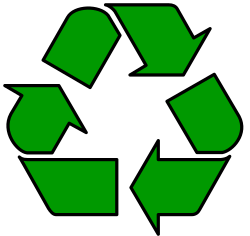A coworker recently asked me for a clear guide for what should be recycled, composted, or trashed.
The Answer
This question is actually surprisingly difficult to answer. This is because recycling rules differ from county to county and even from city to city within a single county. I'll outline some basics, places to go for more info, and some interesting facts about recycling and composting.
Recycling
Most waste haulers offer a single-stream recycling system. This means that all recyclables can go into a single bin that later gets sorted. You may think that single-stream recycling is universal and obvious, but really it isn't. In Japan, some cities have 30 different recycling bins!
The single-stream recycling bin can take most metal, plastic, paper, and glass. The most common exceptions to this list are light bulbs, broken glass, dirty paper or cardboard, juice boxes (or any other box that holds liquid like soup boxes, etc), and plastic bags.
Recology, a waste hauler that serves many places in the Bay Area has a lovely graphic display for their recycling rules. You can find it here.
Why can't I recycling plastic bags?
When I say plastic bags I don't just mean the ones you use in the grocery store to protect your produce or to pack your groceries in -- I mean ALL plastic bags. That includes the ones that your salad mix comes in and the bread bag too. The recycling centers use automated machines to sort all of the items and the plastic bags end up getting stuck in the machinery like string in a vacuum cleaner. If you've ever had that happen to you, you know what I mean, it is not fun.
Do I need to wash out my jars and cans and stuff before I put it in the recycling bin?
For most recyclers, the answer is no, not really, but it's nice. I usually just fill up my jar with water, shake it vigorously to remove the big food pieces, then drain and throw into the bin. Most recycling plants have processes to remove impurities before recycling the item. Check your local waste hauler's website to be sure.
Composting
If your waste hauler offers composting, you should jump on the chance to use it. State law requires composting and recycling to be cheaper than garbage, meaning most people save money when they add composting because they significantly reduce the amount of real garbage they need to have hauled away.
Composting at the smallest scale requires a mix of different plant matter to operate most successfully. When composting at home you should mix together grass cuttings, dead leaves, and your vegan kitchen scraps (no dairy to meat) into a heap about 1 meter cubed. On an industrial scale, however, you can compost a lot more than that. Industrial composting can handle meat (even bones!), dairy, soiled paper (used paper cups, pizza boxes, etc), and bigger yard trimmings (even small branches!).
Some places only offer bins for yard waste, not compostables, so check your local waste hauler's website to be sure. You can find the Recology compost rules graphic here.
Trash
Trash includes everything that doesn't go into the recycle or compost bin, unless it falls under the hazardous waste category. Check out my previous post for information on household hazardous waste. Sadly, most often this trash goes straight to the dump to be preserved for generations upon generations.
In some places, like San Jose, the waste hauler has a MRF system (pronounced "murf") which prevents most waste from ending up at the landfill. Actually, the single-stream recycling also goes to a MRF system, but that is a "clean" MRF, not a "dirty" MRF. The GreenWaste MRF in San Jose can actually sort recycling and compostables from trash thereby removing the vast majority of materials from the waste stream. Pretty cool!

No comments:
Post a Comment